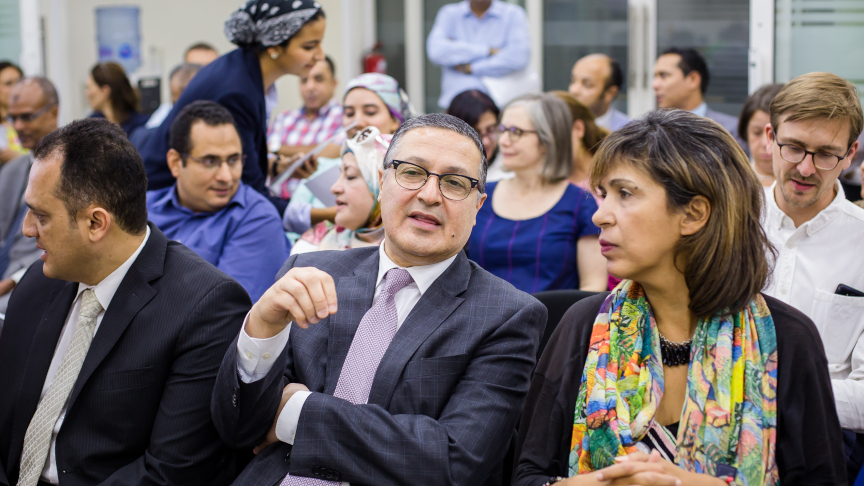ByPalma Conference

Aim and Scope
The three-day event in Aswan was organised by the Faculty of Engineering, Ain Shams University in Cairo under the leadership of Prof. Dr. Hamed El-Mously, the conference chairman. From the 15th to the 17th of December, over 250 participants from 30 countries engaged in fruitful exchange regarding recent developments, technologies, challenges and opportunities related to palm by-products research, manufacturing and crafts. Through the interdisciplinary approach the conference aimed to rediscover palm by-products as an economic resource for the sustainable development of rural communities around the globe. The various contributions presented utilisations of palm by-products in a range of fields such as bio-composites and -fertilisers, sustainable energy production, wood alternatives and panels as well as design and architecture. The areas of applications presented by the experts led to discussions about social and economic opportunities, where future prospects were discussed including governmental visions and policies towards palm by-products utilisation.
After a greeting word by the conference’s co-chair Dr. Mohamad Midani from the Faculty of Engineering and Materials Science, German University in Cairo, the conference itself was opened by Prof. Hamed El-Mously along with governmental representatives including the Ministry of Trade and Industry and the Ministry of Environment officials of international organisations and academia representing Ain Shams University. They all reinforced how important the establishment of such a conference is and highlighted its potential for further collaboration. After the welcoming addresses ByPalma then combined key note speeches and short presentations by specialists with structured plenary sessions and discussion panels as well as a poster session. The multiple formats stimulated active participation and discussion among the experts, which continued way into the coffee and lunch breaks.
COSIMENA Experts at ByPalma
COSIMENA supported the participation of one key note speaker from Germany and two lecturers from the MENA region in order to generate new collaboration projects between German and Arab academics and to foster scientific exchange. Prof. Dr. Arno Frühwald from the University of Hamburg in Germany introduced his research in a keynote speech about “The Use of Oil Palm Trunks for Wood Products” at ByPalma. Prof. Frühwald has a long-time background in wood science, forestry and forest products and furniture making. He illustrated how oil palm trunks can be used after they cannot be utilised for oil production anymore and are being felled. Regions that mainly grow oil palm trees face a declining timber harvest as they don’t grow any other types of wood. In this regard the biomass of oil palm trunks offers a huge potential to substitute timber production made from conventional material. A large joint development project between German and international experts and companies conducted in Southeast Asia, which aimed to improve the use of oil palm trunks in manufacturing marketable timber, delivered promising results. Overall, he gave an insight into an auspicious processing strategy for palm tree trunks which has not only proven to be ecologically sustainable but also has positive economic and socio-economic impacts. Later, he joined the panel in a fruitful discussion about the present status as well as future prospects of date palm by-products utilisation. Dr. Ramzi Khiari from the Higher Institute of Technological Studies in Ksar-Hellal, Tunisia provided insights into his field of expertise in two different lectures talking about date palm fibers as basis for either papermaking or naturally colouring textile materials. Dr. Othman Y. Alothman from King Saud University in Saudi Arabia gave a review of recent development in date palm fibre reinforced polymer composites. He outlined that the natural date palm fibre was found to be one of the most promising candidates to produce lightweight composite structures.
Concurrent Events
The academic part of the conference was enriched with several concurrent events. The Palm By-Products Innovation Exhibition featured several academic projects and start-ups of 30 exhibitors working on empowering the environmental ecosystem in Egypt and the MENA region. 30 exhibitors presented their research as well as traditional and modern products and crafts made from palm by-products. Moreover, a Palm By-Products Photo Gallery with more than 200 photos was showcasing the culture of utilisation of palm by-products in Egypt. The gallery included photos from the ancient Egyptian era, traditional crafts, and modern products and practices. The conference also hosted the finals of the first worldwide Zero Agro “Waste” Competition. The idea behind the competition was to encourage entrepreneurs, start-ups, students and young researchers with innovative ideas in the field of agricultural waste management that can turn agricultural “waste” into something valuable. Ten finalists from seven countries have been selected to display their innovative products and creative crafts from palm by-products and to pitch their projects at the conference. They were also given the chance to receive support and mentorship from international top experts in the field.
Conclusion
In summary, the conference was a welcomed and well accepted platform that gave room for participants to exchange views regarding the status quo and prospects of palm by-products utilisation. It strengthened existing collaborations and encouraged to further work in the field of sustainability. As a conclusion, ByPalma presented recommendations regarding future strategies. In terms of legal guidelines, the conference suggested the regulation of palm plantations and supporting already existing initiatives as well as entrepreneurs in recycling palm by-products. Further studies will be conducted to improve the use of palm by-products and to develop new technologies. Finally, awareness programmes should be established to highlight the value of palm by-products as a renewable sustainable material base.
Further Information
For more information on the ByPalma Conference please visit www.bypalma.com.

















